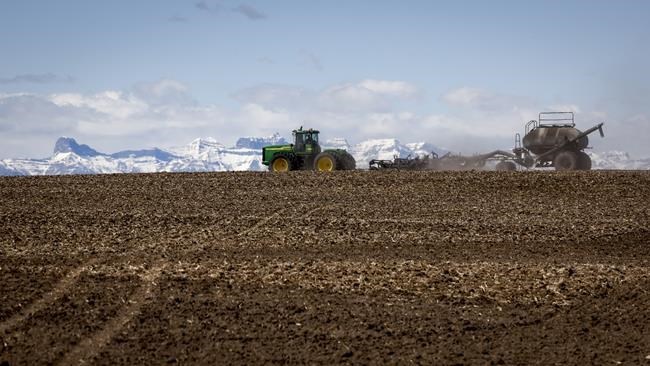OTTAWA — The Canadian Agri-Food Policy Institute is recommending that governments across the country develop a national plan to sustainably manage and use water for the agri-food sector.
In a report released Monday, the institute called for ambitious commitments from governments and partnerships with stakeholders to prioritize the critical natural resource.
“Water is a strategic asset for Canada, and an increasingly critical and important one,” said Tyler McCann, CAPI managing director and report co-author.
“We need to do a better job understanding its value, understanding that it's an asset that can and should be leveraged, but an asset that also needs to be conserved and managed.”
The report calls water “the challenge of the 21st century.”
“The urgency of the need to produce more food, more sustainably, while adapting the food system to extreme weather and climate change should be felt by governments, farmers, food processors and everyone that is involved in the food system from field to fork,” the report said.
Immediate action is required to lay the groundwork for effective water management, the institute said in a press release, including to develop uniformity in data collection regarding groundwater and surface water, and investment in research. It also recommends launching an expert panel next year and releasing a national action plan by July 2025.
Canada has “a fragmented and siloed model for water management,” according to the report, with data collection and reporting “far from standardized or complete.” It recommends using watersheds as the basis for research and innovation.
“Because water is typically managed at a provincial level you get differences in how data is collected,” explained McCann. “We need to do more to make sure that the data collection that we’re doing, the reporting that’s going on, is standardized across the country.”
One of the report’s recommendations is for a regular report on the state of agri-food water, he said, providing “a clear accounting of how much water agriculture and food is using across the country, how that water is –°¿∂ ”∆µ protected and managed, what kind of investments are –°¿∂ ”∆µ made.”
Water is a crucial resource for the production of food in Canada, and farmers in this country have been grappling with drought for several summers in a row, with irrigation often the only thing keeping crops going in some areas.
In 2021, a particularly bad year saw production of some crops fall to their lowest level in more than a decade.
McCann said farmers and the rest of Canada are increasingly dealing with extremes: droughts, but also heavy rains and floods. That’s why flexible infrastructure will be key to managing water supply, he said.
The cost of extreme weather and rising heat runs to the tune of billions of dollars, the report said, including on farmers and the entire agri-food sector.
Water -- its quality, and the availability of it -- has the power to redefine international food trade and domestic agricultural production, the report said. “Without water, the equation is very simple: there is no agriculture. And without agriculture, no one is fed.”
Food production around the world is facing major challenges related to climate change, biodiversity loss, geopolitical instability and disease, the report said.
As a major food exporter, Canada is also home to a fifth of the world’s freshwater reserves, the report notes. And as the world’s population grows, there’s increasing pressure to produce more even as the climate-related challenges facing farmers mount.
This country has an obligation to assume a leadership role in managing its water, and its approach must be a collaborative one, involving all levels of government, the report argues.
There are multiple issues affecting water quality and availability in Canadian agri-food, the report said. In the west, access to water for irrigation is the dominant concern, with agricultural production at stake, particularly in the Palliser Triangle, which includes much of southeast Alberta, some of southern Saskatchewan, and the southwest corner of Manitoba.
Alberta has two-thirds of all Canadian irrigated land, the report said, even as the province generates around a third of total agriculture sales.
The federal government this year has promised to update legislation that governs water use, and formally announced that the new Canada Water Agency will be headquartered in Winnipeg.
More communication and clarity about the role of the agency is needed, the report said, noting this will likely become more clear when new legislation is introduced.
-- With files from Amanda Stephenson
This report by The Canadian Press was first published Oct. 23, 2023.
Rosa Saba, The Canadian Press




